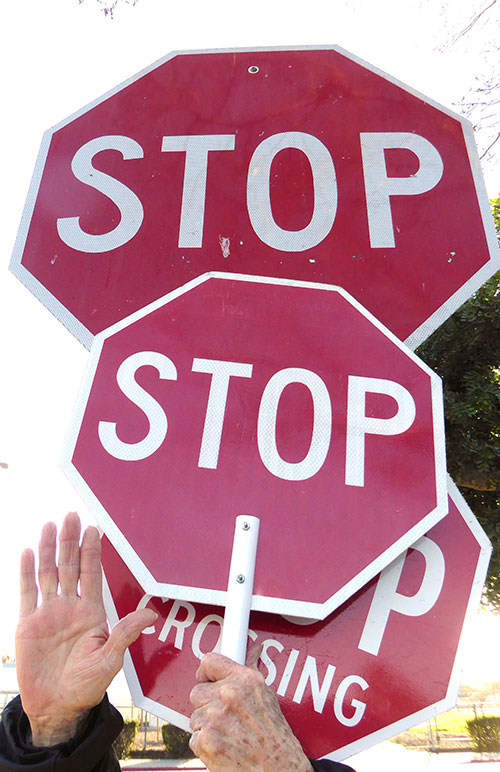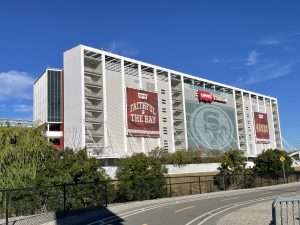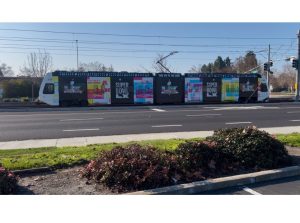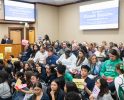
Rush hour for sex trafficking is about to begin as an anticipated one million football fans converge on the Bay Area for Super Bowl 50 pre-game events and the game itself on February 7 at Levi’s Stadium in Santa Clara.
Santa Clara Police Chief Michael Sellers makes the point that sex trafficking has surrounded large-scale events for a long time.
“Now with Super Bowl, it brings sex trafficking to the forefront,” says Sellers. “The good thing is that it brings awareness to a year-round issue. What’s important is to be aware and educated about this important subject.”
Human trafficking involves controlling a person through force, fraud or coercion and using the person, whether child or adult, for forced labor, domestic servitude or sexual exploitation. Because human trafficking is undercover and underreported, it is difficult to collect accurate data and figures vary.
Nonetheless, according to the International Labor Organization, some 21 million people worldwide are trafficked, generating $150 billion in illegal profits per year. UNICEF estimates that about two million children are trafficked for sex. California, including the Bay Area, is one of the top four trafficking destinations in the U.S. (www.htcourts.org).
Anticipating the influx of people that Super Bowl 50 would bring to the Bay Area, ​the Santa Clara County Sheriff’s Office and the Santa Clara County District Attorney’s Office received funding in July 2014 to create a Human Trafficking Task Force, headed by San Jose Supervisor Cindy Chavez.
Local efforts have included offering hotel, airport and transportation workers training on how to identify and report human trafficking and ads on buses. All SCPD officers have received special training, according to Sellers, who, along with Santa Clara Mayor Jamie Matthews, is a member of the Human Trafficking Task Force.
The Department of Homeland Security (www.dhs.gov/blue-campaign) lists misconceptions about human trafficking on its website. Although it gives indicators to help identify victims, it emphasizes that one should never attempt to confront a suspected trafficker or even signal a suspected victim about suspicions. Rather, law enforcement should be contacted: National Human Trafficking Hotline: (888) 373-7888 or text: “Help” to BeFree (233733); Santa Clara County Sherriff’s tip line: (408) 918-4960.
Until 2014, mainly anecdotal information about sex trafficking and the Super Bowl was available. In March 2014 and February 2015, the Office of Sex Trafficking Intervention Research at Arizona State University released the results of a research-based, two-year study it conducted.
The report “Exploring Sex Trafficking and Prostitution Demand during the Super Bowl 2014” points out that, contrary to public perception, prostitution is “very often not the choice of the victim but rather the compulsion of the victimizer….”
It concludes that “the Super Bowl, or any other large event that provides a significant concentration of people in a relatively confined urban area, becomes a desirable location for a trafficker to bring their victims for the purposes of commercial sexual exploitation. The same can be said of virtually any other criminal offense–the propensity for a given offense to occur tends to increase with a similar increase in victim and suspect populations.”
The study involved analyzing thousands of commercial sex ads prior to Super Bowl 2014 in New Jersey and Super Bowl 2015 in Arizona. Through placing decoy ads, it also studied the demand for sex buying ten days prior to and including the two Super Bowl Sundays.
The 2014 report suggests that public awareness, education and dispelling myths is critical to preventing sex trafficking. However, “Exploring the Impact of the Super Bowl on Sex Trafficking 2015” reveals that there has been an increase in activity in northern New Jersey and Phoenix despite greater public awareness and law enforcement attention.
“Demand for commercial sex continues unabated, with the online market being the presumptive medium of choice to solicit sex and arrange contacts.” Thus, the report’s recommendation is to police the virtual world as well as the real world.
The report also recommends dispelling “the myth that prostitution is a victimless crime, by showing that it is dangerous and has the potential to involve violence, drug use and poses public health concerns for both buyers and sellers as victims of sexual exploitation will be forced to take higher risks.”
An incidence of such violence took place January 15 outside a hotel near Detroit, MI, during a child sex-trafficking sting linked to the North American International Auto Show at Cobo Center in downtown Detroit. An undercover officer was shot in his bullet-proof vest–sustaining a minor injury–but was able to return fire, killing the suspect.
“We have only begun to scratch the surface in the fight against human trafficking….I see part of our job… as making it hard to be a trafficker. Together we can do this,” writes human trafficking activist Nita Belles in her book “In Our Backyard.”
Free Community Events to Raise Awareness and Stop Trafficking: Jan. 21, 6 p.m., grand opening of “Coolie,” an art installation on labor trafficking during the Gold Rush era in the mid-1800s, by Santa Clara University professor Jonathan Fung, at the de Saisset Museum on the Santa Clara University campus. Jan. 28, 6 – 8 p.m., also at the de Saisset Museum, Sex Trafficking Symposium, moderated by Fung.
Jan. 25, 6:30 – 8 p.m., discussion with Nita Belles, author of “In Our Backyard, Human Trafficking in America and What We Can Do To Stop It,” at Sunnyvale Presbyterian Church, 728 W. Fremont Ave., Sunnyvale.
Information and Resources: The Santa Clara County Sheriff’s Office (www.sccgov.org/sites/sheriff/Pages/humantrafficking) and the South Bay Coalition to End Human Trafficking (www.southbayendtrafficking.org). Also, its video on red flags to recognize victims: www.youtu.be/KE8tZafMGWw. Â Former California State Assemblymember Sally Lieber’s website: (www.sallylieber.org/Stop-Human-Trafficking-CA.html).











0 comments